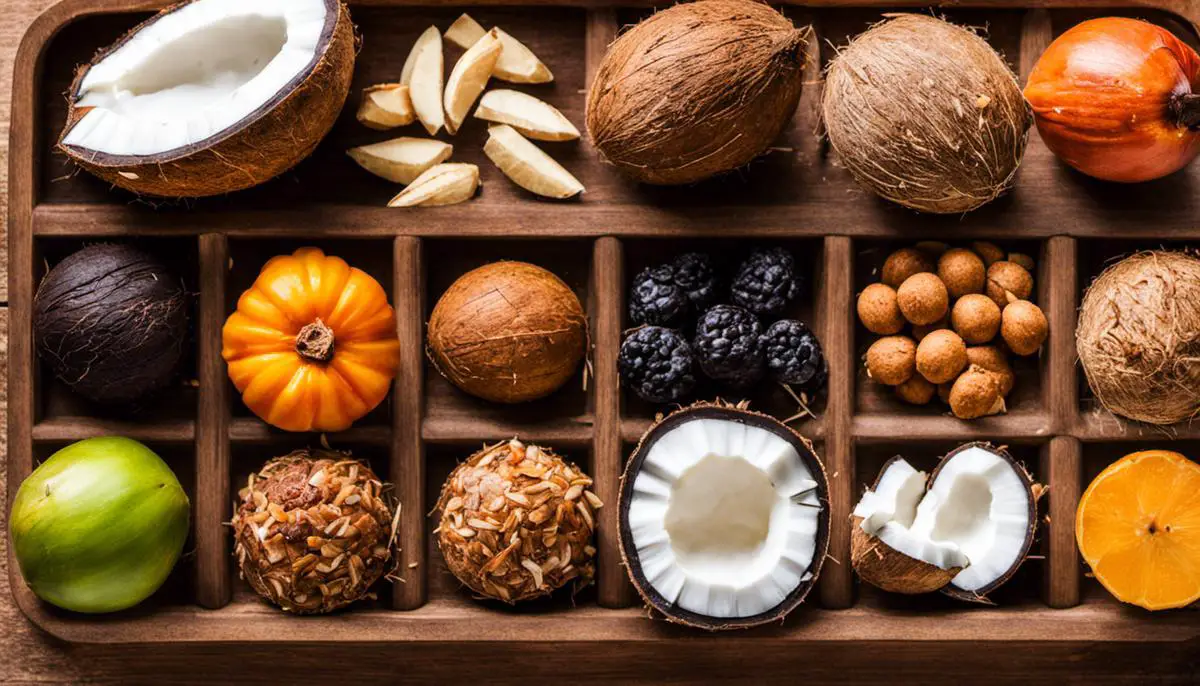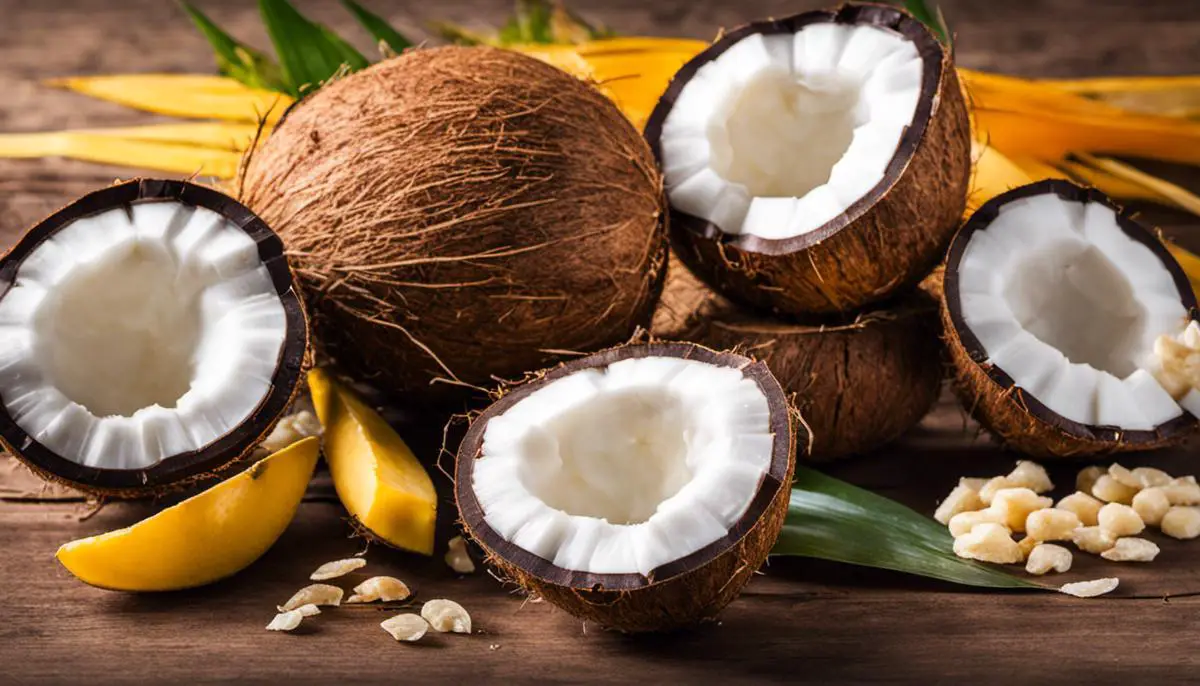Table of Contents
Welcome to a comprehensive exploration of coconut—an unexpectedly versatile ingredient with astounding health benefits. Our discussion dives into the dynamic world of coconut nutritional values, introducing you to the incredible mix of vitamins, minerals, and the essential fiber that this tropical asset offers. From there, we voyage through the wide variety of healthy coconut snacks available in the market today, giving you a broad spectrum of excellent choices to satisfy your cravings. Lastly, we roll up our sleeves and delve into the joy of creating homemade coconut snacks, offering flavorful recipes that you can prepare in the comfort of your own kitchen. This journey also equips you with knowledge about choosing healthier commercial coconut snacks, highlighting the importance of food labels, added sugar, and preservative content. Enjoy the read, and let the coconut power spark a lifestyle change!
Understanding Coconut Nutritional Value
Coconuts are much more than their tropical allure; they boast an impressive nutritional profile that contributes to their status as a healthy snack option.
A cup (80g) of shredded, raw coconut meat has approximately 283 calories, primarily from its high fat content (27g). However, the majority of this fat is saturated fat, which can be beneficial in moderate amounts as recent studies have begun to debunk the idea that all saturated fats are harmful.
Coconuts are also rich in dietary fiber, providing almost 18g per one-cup serving. These high fiber contents promote digestive health and contribute to feelings of fullness, which can aid in weight management.
Apart from fats and fiber, coconuts are also an excellent source of minerals.
They can provide significant amounts of manganese, copper, selenium, and iron — all essential for various physiological processes in the body.
Manganese, for instance, is necessary for bone health and the metabolism of carbohydrates, proteins, and cholesterol.
Coconuts also offer a small surge of vitamins: a cup of coconut contains 0.2 mg of Vitamin B6, a Vitamin that helps in brain development and function.
Moreover, coconuts contain antioxidant compounds that can protect cells from damage and aging.
Consuming coconut conscientiously particularly if you’re managing your calorie intake, is crucial since it’s a high-calorie food.
Portion control should practice while consuming coconut snacks, to avoid any excessive calorie intake.
Furthermore, it’s recommended to choose raw and unprocessed coconut snacks over ones containing additional sugars or artificial elements to reap its fullest health benefits.
In general, adding coconut mindfuly to your diet can offer a tasty, nutritional choice for snack enthusiasts.

Photo by brookelark on Unsplash
Different Types of Healthy Coconut Snacks
Coconut treats has captivated a substantial following of health-conscious snackers seeking stimulating alternatives to everyday snacks.
Various brands have launched products that highlight the many health benefits of this exotic fruit. Coconut chips, which are finely sliced and baked pieces of coconut flesh, have gained wide popularity. These can be enjoyed on their own or as a crunchy garnish on a variety of dishes like salads, oatmeal, and yogurt. Thanks to their sweet taste and satisfying crunch, they serve as a healthier substitute for classic potato chips.
Some coconut snacks incorporate the fruit in more comprehensive snack options, such as bars and balls. Coconut bars often blend the shredded coconut with sweeteners and other flavorful ingredients like dark chocolate and nuts. They provide a filling and nutrient-dense snack that’s portable and easy to pack. Similarly, coconut balls, often combined with dates or rolled oats, and sometimes coated in dark chocolate, provide a bite-sized snack packed with fiber and healthy fats.
Exploring Homemade Coconut Snacks
Coconut, a versatile tropical fruit, promises numerous health benefits that can be harnessed through various homemade snack recipes. Examples of these wholesome recipes include coconut biscuits which combine the unique texture and flavor of coconut to create a heart-healthy snack. The use of coconut oil, renowned for its health benefits such as heart health improvement, fat burning promotion, and quick energy provision, is often incorporated. The affordability and customization that homemade coconut snacks offer, ranging from chips and bars to balls and biscuits, make it an excellent way to enjoy the nutritional benefits of coconut daily.

Photo by izzyfisch_ on Unsplash
Homemade Coconut Snack Recipes
The Health Benefits and Delicious Taste of Coconut Recipes
Coconut-based recipes are not just a delight for the taste buds, but also serve as a treasure trove of health benefits. Packed with fiber, vitamins, and beneficial fats, coconut aids in digestion, promotes cardiovascular health, and could even assist in weight loss endeavors, making it a fabulous component of a balanced diet.
A prime example of a healthy coconut snack is homemade coconut chips. Made with thin slices of coconut meat, a splash of honey, and a pinch of salt before being baked to a light golden crisp, these chips make a speedy on-the-go snack or an appetizing crunch to your salads.
Another favorite recipe is coconut energy balls, which are surprisingly filling and energizing.
These sweet yet healthy treats typically include ingredients like dates, almond butter, rolled oats, coconut flakes, and a tad bit of vanilla extract.
You just need to mix them in a food processor, roll into round small bite-size portions, and then allow to chill in the refrigerator.
Variations of these treats are abundant, with many people adding nuts, seeds, chocolate chips, or protein powder for a supplemental boost of energy.
For a savory alternative, coconut roasted vegetables offer a unique way to incorporate this versatile ingredient.
Simply dice your favorite root vegetables, toss them in coconut oil, sprinkle with toasted shredded coconut, seasonings, and bake them until crispy.
This simple yet flavorsome dish adds a tropical twist to regular oven-roasted veggies.
Indulging in coconut-based snacks is more than just a treat for your taste buds; it’s a step towards a healthier way of life. These delightful morsels are not only delicious, but they’re also packed with nutrients that can contribute to your overall wellness.

Choosing Healthier Commercial Coconut Snacks
Making the right choice
Choosing healthier commercial coconut snacks involves more than just grabbing the first product off the shelf. You need to be well-versed in reading food labels. These labels are a wealth of information, outlining everything from ingredients and nutritional value to advisable serving sizes. Always opt for snacks where coconut features prominently in the ingredients list – this signals that the snack is predominantly made from this nutritious fruit. Beware of lengthy ingredient lists filled with unpronounceable substances, indicating artificial additives or preservatives. The nutrition facts label also offers important details such as calorie count, sugar, and fiber content. Aim for coconut snacks that are low in calories, high in fiber, and with as little sugar as possible, ensuring you reap the maximum health benefits from your snack choice.
Another factor to evaluate: added sugar
Regular consumption of high-sugar foods can lead to health risks such as obesity, heart diseases, and diabetes. Coconut is naturally sweet, so healthier snack options will have low quantities of added sugars. When shopping, read the nutrition facts label and look for terms such as ‘sugar’, ‘syrup’, ‘honey’, or words ending in ‘-ose’, which indicate the presence of additional sugars.
Lastly, evaluate the preservative content
Preservatives are substances added to foods and other products to prevent them from spoiling, but some have been linked to potential health concerns. When selecting coconut snacks, go for options that have few or no preservatives. This typically indicates the product is fresher and less processed. The lack of preservatives might entail a shorter shelf-life, but the benefits of a more wholesome and healthier snack make the trade-off worthwhile.

This voyage into the world of healthy coconut snacks surely provides a solid foundation for a flavorful, yet healthful, dietary shift. Armed with a good understanding of coconut’s nutritional composition and the wholesome benefits it delivers to your health, you can now confidently incorporate coconut into your daily snacks. With a list of homemade coconut snack recipes at your disposal, let your kitchen turn into a mini-factory of healthy, delightful treats. Furthermore, being knowledgeable about what to look out for when purchasing commercial coconut snacks—such as food labels, added sugar, and preservative content—safeguards you from unhealthy choices. So, go ahead and enjoy the world of coconut snacks. Happy snacking!
